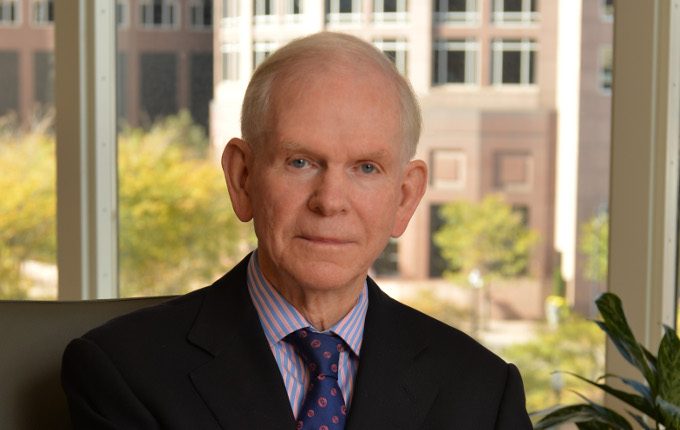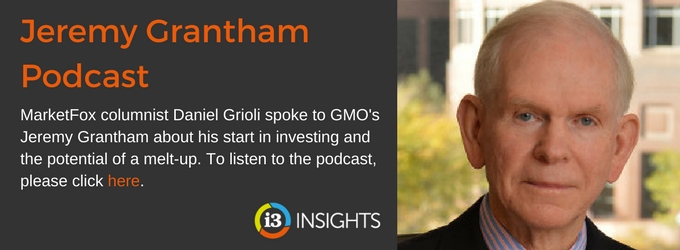Asset managers don’t take enough risk when implementing their best ideas, according to veteran investor and GMO co-founder Jeremy Grantham.
“By far the biggest risk in the long run is to try and avoid risk, to try and hedge everything out,” Grantham says.
“Forget it. You’ve got to learn to take some risk and hit the ball hard. You don’t get that many great opportunities to make money.”
Speaking exclusively to MarketFox columnist and blogger Daniel Grioli in a podcast for [i3] Insights, Grantham reflects on his start in the investment management business and shares some of the advice he would give current participants in the market.
“When you have a good idea and you think the wind is in your sail, you have to hit the sucker,” he says.

When you have a good idea and you think the wind is in your sail, you have to hit the sucker
Grantham advocates innovation, rather than sticking dogmatically to a set of investment rules carved out by past heroes.
“I think value managers tend to be worshipping a little too much in the Church of Value: these are the rules and the patron saint is Ben Graham,” he says.
“Actually, Ben Graham had in 1963 a later-stage conversion to being a lot more open-minded about the central truths.”
Instead, he urges investors to always challenge the status quo and try new ideas.
“Challenge everything and keep your mind open. Trial and error; try things in a small way, learn in the real world how they work and do it quickly, move fast, be an early adopter,” he says.
He illustrates his beliefs with a practical example of a good value opportunity in emerging markets in 2016.
“Eighteen months ago the Shiller P/E [for emerging markets] was 10. It has never been lower than 10 in 25 years. That day, the Shiller P/E on the US [market] was 21 or 22,” he says.
“A few years earlier, in early 2008, emerging [markets] had sold at a premium to the S&P, so you knew it could be a premium and now it is less than half. It is cheaper than it has ever been and nothing else was priced very attractively.
“Why would you put 10, 15 or 20 per cent in emerging? I’m pleased to say that I put 50 per cent of my sister’s pension fund and my children’s into emerging. [But] when I wrote this up, I thought: ‘What was I thinking? Why didn’t I put in 100 per cent? I can’t even take my own medicine.’”

People get carried away with the relationship with the market. Beta is important, but value is [also] important
He argues many investors place too much importance on diversification, which would have stopped them from placing a big bet on emerging markets.
“You have one asset class that is cheap and everything else is expensive and the one asset that is cheap is 28 countries, including China, India, Brazil … the countries that will be the main backbone of growth until 2100,” he says.
“It is massively diversified, so why would you worry about diversification? Yet, the mantra is ‘diversify, diversify, diversify’ and that has transferred into terrible career risk, which runs and has ruined, to a certain degree, our [industry].
“So everyone feels: ‘Oh, I put 18 per cent in emerging. How dangerous! How risky!’ And [they put] 82 per cent in overpriced, over-diversified rubbish. How do you justify your existence with that type of portfolio?”
He acknowledges many asset managers don’t take enough risk out of fear for their careers, but he also warns correlations can break down and relying on beta could result in devastating returns.
“People get carried away with the relationship with the market, the so-called beta, and beta is important, but value is [also] important,” he says.
“If you go into a market overpriced, like emerging markets was in 2008, you will drop like a stone.
“They went down 60 per cent in two or three months; they fell much faster than the S&P.
“[But] if you go in cheap, as small caps and REITs (real estate investment trusts), which act as small caps most of the time, were in early 2000 … small-cap value was up 3 per cent, while the S&P was down 50 per cent and REITs were up 35 per cent.
“But they were high beta stocks, they were 1.2 times the market beta, and they went up while the S&P went down 50 per cent, because value is so important when it gets extreme.
“So I don’t think there is any material chance that if the market breaks tomorrow that emerging will end up at the bottom. In fact, the odds are much better than 50/50 that it will have gone down materially less [than the S&P 500 Index].”
__________
[i3] Insights is the official educational bulletin of the Investment Innovation Institute [i3]. It covers major trends and innovations in institutional investing, providing independent and thought-provoking content about pension funds, insurance companies and sovereign wealth funds across the globe.



